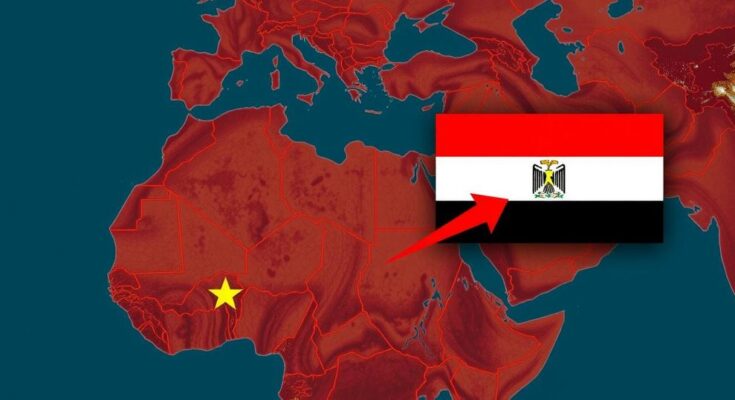In October 2023, Egypt, Eritrea, and Somalia convened in Asmara to establish military support for Somalia against terrorism, reflecting Egypt’s intensified strategic alliances amid Ethiopia’s expanding influence via a military cooperation agreement with Somaliland. This summit marks a broader Egyptian effort to secure regional allies while addressing threats from the Grand Ethiopian Renaissance Dam (GERD) and the recent Entebbe Agreement, which alters water management dynamics in the Nile Basin. The gathering underscores a renewed military focus in Egypt’s diplomatic relations as it seeks to reclaim influence in Africa.
In early October, a cooperation summit in Asmara saw the presidents of Egypt, Eritrea, and Somalia unite in their commitment to support Somalia’s military initiatives against terrorism through troop deployments under the African Union mission. This gathering is considered a strategic response by Egypt to counter Ethiopia’s burgeoning influence in the Horn of Africa, especially given Ethiopia’s agreement with Somaliland regarding military collaboration and recognition of its independence. The long-standing diplomatic tension between Egypt and Ethiopia has primarily revolved around the Grand Ethiopian Renaissance Dam (GERD), which Cairo perceives as a significant threat to its national security. In addition, the recent implementation of the Entebbe Agreement, a critical framework for the management of Nile River waters, is viewed by both Egypt and Sudan as detrimental to their water interests. Iman Abdel Azim, a political science professor at Cairo University’s Institute of African Studies, notes that Egypt’s intensified military partnerships with neighboring countries stem from a desire to restore its influence within Africa. These military collaborations, including a military defense agreement with Somalia and a mutual defense pact with Eritrea, signal a shift towards stronger security-oriented alliances in the region. Amani El-Tawil, Director of the African Program at Al-Ahram Centre for Political and Strategic Studies, remarks that Egypt’s response is a direct result of Ethiopia’s unilateral actions concerning the GERD and its attempts to strengthen ties within the Nile Basin, evidenced by the recent ratification of the Entebbe Agreement by South Sudan. Ethiopia’s ambitions, described by experts as expansionist, are growing as they seek to establish a military presence in Somaliland, which indirectly challenges Egypt’s interests. As such, Egypt’s military activities in the region are not only aimed at gathering allies but also serve as leverage against Ethiopia to compel negotiations regarding shared water resources. The dynamics are further complicated by internal pressures within Egypt, stemming from the GERD crisis, diminishing revenues from the Suez Canal, and geopolitical uncertainties involving neighboring countries. Egypt’s alliances in the Horn of Africa reflect a broader strategy to circumvent potential threats while reclaiming a dominant role in a region where its influence has waned since the days of Gamal Abdel Nasser. As tensions escalate, it appears Egypt is pivoting towards a military-diplomatic approach to bolster its position against Ethiopia, which in turn may precipitate further conflict in a region fraught with historical rivalries and resource disputes.
The situation in the Horn of Africa has become increasingly complex due to Egypt’s longstanding concerns regarding Ethiopia’s utilization of the Nile River and the construction of the GERD. Since its inception, the dam has been a point of contention, with Egypt fearing significant reductions in its water supply. Concurrently, Ethiopia has sought to strengthen its influence in the region by engaging with various local entities, including the self-declared republic of Somaliland. The diplomatic landscape has shifted significantly over the past few decades, particularly following the Entebbe Agreement, which reshaped the framework for Nile Basin countries. Egypt’s reliance on its allies and the strategic moves towards military partnerships with nations like Eritrea and Somalia highlight its urgent need to reclaim influence and address perceived threats from Ethiopia’s growing capabilities. As a result, a new regional axis is emerging that is characterized by military collaboration combined with diplomatic efforts to negotiate terms favorable to Egyptian interests in the Horn of Africa.
In conclusion, the recent summit in Asmara signifies a pivotal moment for Egypt as it seeks to regain control over its regional influence in the Horn of Africa amidst Ethiopia’s ascendant role. The strategic military partnerships being forged by Egypt with nations like Eritrea and Somalia are not merely about counter-terrorism but also serve as a direct counterbalance to Ethiopia’s ambitions, particularly concerning the Nile River dispute. As the situation evolves, the potential for conflict remains, particularly if Egypt’s efforts are unable to lead to effective negotiations regarding shared water resources.
Original Source: www.newarab.com




